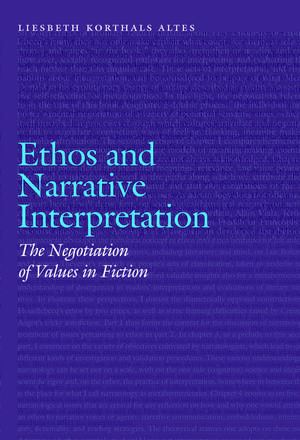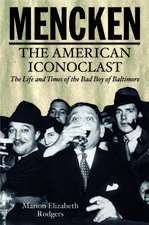Ethos and Narrative Interpretation: The Negotiation of Values in Fiction: Frontiers of Narrative
Autor Liesbeth Korthals Altesen Limba Engleză Hardback – 30 iun 2014
Demonstrating the extent to which ethos attributions, and hence, interpretive acts, play a tacit role in many methods of narratological analysis, Korthals Altes also questions the agenda and epistemological status of various narratologies, both classical and post-classical. Her approach, rooted in a broad understanding of the role and circulation of narrative art in culture, rehabilitates interpretation, both as a tool and as an object of investigation in narrative studies.
Din seria Frontiers of Narrative
-
 Preț: 233.13 lei
Preț: 233.13 lei -
 Preț: 425.86 lei
Preț: 425.86 lei -
 Preț: 356.55 lei
Preț: 356.55 lei -
 Preț: 357.49 lei
Preț: 357.49 lei -
 Preț: 392.66 lei
Preț: 392.66 lei -
 Preț: 213.49 lei
Preț: 213.49 lei - 19%
 Preț: 362.26 lei
Preț: 362.26 lei -
 Preț: 415.70 lei
Preț: 415.70 lei -
 Preț: 313.65 lei
Preț: 313.65 lei -
 Preț: 148.86 lei
Preț: 148.86 lei -
 Preț: 248.23 lei
Preț: 248.23 lei -
 Preț: 362.11 lei
Preț: 362.11 lei -
 Preț: 249.75 lei
Preț: 249.75 lei -
 Preț: 320.46 lei
Preț: 320.46 lei -
 Preț: 250.73 lei
Preț: 250.73 lei -
 Preț: 289.17 lei
Preț: 289.17 lei -
 Preț: 428.75 lei
Preț: 428.75 lei -
 Preț: 213.65 lei
Preț: 213.65 lei -
 Preț: 254.59 lei
Preț: 254.59 lei -
 Preț: 429.51 lei
Preț: 429.51 lei -
 Preț: 389.17 lei
Preț: 389.17 lei -
 Preț: 397.66 lei
Preț: 397.66 lei -
 Preț: 397.45 lei
Preț: 397.45 lei -
 Preț: 266.51 lei
Preț: 266.51 lei -
 Preț: 428.14 lei
Preț: 428.14 lei -
 Preț: 428.53 lei
Preț: 428.53 lei -
 Preț: 429.89 lei
Preț: 429.89 lei -
 Preț: 355.58 lei
Preț: 355.58 lei -
 Preț: 432.18 lei
Preț: 432.18 lei - 15%
 Preț: 458.08 lei
Preț: 458.08 lei -
 Preț: 395.31 lei
Preț: 395.31 lei -
 Preț: 511.81 lei
Preț: 511.81 lei -
 Preț: 511.81 lei
Preț: 511.81 lei -
 Preț: 391.89 lei
Preț: 391.89 lei -
 Preț: 508.71 lei
Preț: 508.71 lei -
 Preț: 471.28 lei
Preț: 471.28 lei - 23%
 Preț: 454.18 lei
Preț: 454.18 lei -
 Preț: 511.59 lei
Preț: 511.59 lei -
 Preț: 511.43 lei
Preț: 511.43 lei -
 Preț: 246.66 lei
Preț: 246.66 lei -
 Preț: 183.77 lei
Preț: 183.77 lei -
 Preț: 510.06 lei
Preț: 510.06 lei -
 Preț: 251.11 lei
Preț: 251.11 lei -
 Preț: 434.01 lei
Preț: 434.01 lei -

Preț: 431.62 lei
Nou
Puncte Express: 647
Preț estimativ în valută:
82.59€ • 86.24$ • 68.20£
82.59€ • 86.24$ • 68.20£
Carte disponibilă
Livrare economică 25 martie-08 aprilie
Preluare comenzi: 021 569.72.76
Specificații
ISBN-13: 9780803248366
ISBN-10: 0803248369
Pagini: 344
Dimensiuni: 152 x 229 x 29 mm
Greutate: 0.66 kg
Editura: Nebraska
Colecția University of Nebraska Press
Seria Frontiers of Narrative
Locul publicării:United States
ISBN-10: 0803248369
Pagini: 344
Dimensiuni: 152 x 229 x 29 mm
Greutate: 0.66 kg
Editura: Nebraska
Colecția University of Nebraska Press
Seria Frontiers of Narrative
Locul publicării:United States
Notă biografică
Liesbeth Korthals Altes is a professor of general literature in the Department of Arts, Culture, and Media in the Faculty of Arts at the University of Groningen in the Netherlands. She is the author or coeditor of several books including Authorship Revisited: Conceptions of Authorship around 1900 and 2000 and The Autonomy of Literature at the Fins de Siècles (1900 and 2000): A Critical Assessment.
Cuprins
Preface
Why Ethos?
Part 1. Ethos, Narrative, and the Social Construction of Meanings and Values
1. Literary Interpretation, Ethos Attributions, and the Negotiation of Values in Culture
2. Ethos as a Social Construction: Authorial Posturing, Conceptions of Literature, and Value Regimes
Part 2. Ethos in Narratology: The Return of the Repressed
3. Narratology between Hermeneutics and Cognitive Science
4. Key Concepts Revised: Narrative and Communication, Embeddedness, Intentionality, Fictionality, and Reading Strategies
5. Whose Ethos? Characters, Narrators, Authors, and Unadopted Discourse
Part 3. Further Explorations: Contracts and Ethos Expectations
6. Generic Framing and Authorial Ethos
7. Sincerity and Other Ironies
On Narrative, Ethos, and Ethics
Notes
Works Cited
Index
Recenzii
"Ethos and Narrative Interpretation . . . succeeds in presenting a type of narrative reading that opens new directions, while never forgetting to have a new close look at the basic issues of the discipline."—Jan Baetens, Leonardo Reviews
"I can highly recommend Ethos and Narrative Interpretation to experienced researchers in the fields of narratology and hermeneutics, and also to scholars who are interested in thinking about the place of literary studies in today’s society: the book provides a number of very convincing answers to the important question of why study literature."—Jan Alber, Style
“With its emphasis on ethos and the negotiation of values, this book will have a lasting impact on the way in which narratology redefines its core concerns. By grounding her argument in rhetoric, Korthals Altes offers a methodological alternative to text-oriented readings, while her insistence on the importance of values adds a new dimension to existing rhetorical approaches in narratology.”—Roy Sommer, author of Literature and Memory













